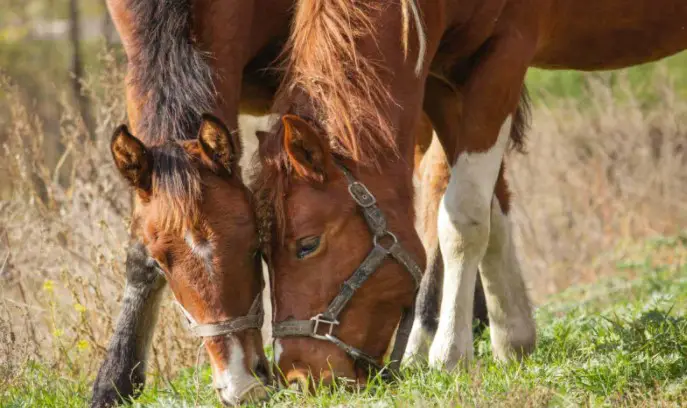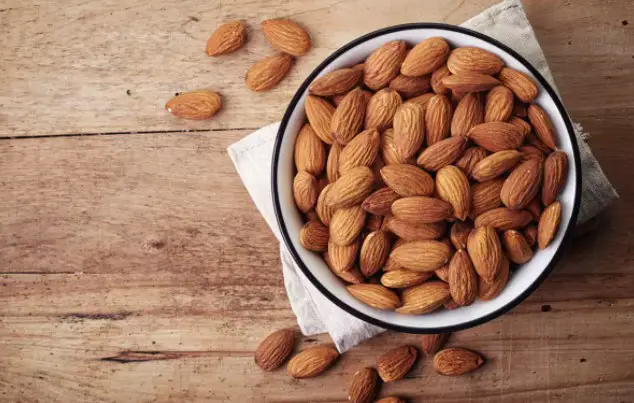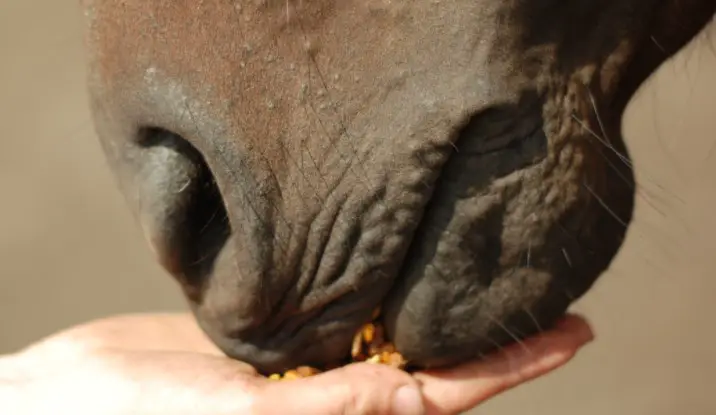Can horses eat almonds? Yes, horses can eat almonds. They make excellent treats for your horse. Not only is it a break from the regular hay and stubble, but it is also sweet and packed with amazing nutritional benefits. However, just as with all things fun and sweet, they should be given in moderation.
Is there a side effect or a regulatory amount they must not exceed? As we walk through this article, we intend to shed more light on this.
Nutritional benefits of almonds to your horse
People can eat almonds any way they like. In the varieties of almonds, there are a lot of health benefits naturally attached to them. In humans, almonds are important in improving a person’s blood cholesterol status and ultimately controlling weight. This is because of the unsaturated fat they contain.

Almonds are also rich in vitamin E and biotin, which makes them suitable for skin and hair health. They also contain minerals such as copper and manganese.
In horses, almonds also perform interesting roles in the overall health of your horse. These roles include;
Boosting immune system
Similar to that of humans, a calculated intake of almonds can be beneficial to the immune system of the horse. For instance,
Aids digestion
The hulls of almonds are rich in fibers necessary for ease of digestion. Taking feeds containing almond hulls or feeding them directly to him can significantly improve his digestion.
Hoofs
Manganese, copper, vitamin E, and biotin are essential for maintaining a healthy horse hoof.
Did you know these things about almonds?
Almonds are easily one of the best healthy treats you or a horse can eat. I bet there are several interesting and amazing facts about almonds you did not know.

Almonds are not nuts.
They are not nuts but belong to a group known as drupes. This family encapsulates fruits such as peaches. When the almonds dry, they peel.
Many almonds are pasteurized.
Almost all almonds that come from the United States are not truly raw! They go through heat processing to prevent them from spoiling. If you want raw almonds, you must buy them from outside the United States.
Almonds are friends with bees.
Almonds naturally cannot self-pollinate and need insects, especially bees, to help solve that. Bees are particularly useful in the pollination of many flowering plants. You should also know that apart from almonds, there are other foods we would not have without the natural pollination of bees.
Almonds rely entirely on the bees to help. Thus no bees, no almonds.
Because of the need for bees, many almond farmers sometimes rent bees! There might be farms with no bees, so the almond farmers rent these bees to aid pollination. Thus it is not surprising the production cost of almonds is high.
No part of the almond is wasted.
The outer hulls not eaten by humans are instead used as part of the feed for cattle. So literally, no part of almonds goes to waste. Another thing is that up until the production process, the almond hull remains on the fruit keeping the almonds from environmental pollution and toxins.
Different Kinds of Almonds
Did you know that there are about 30 different kinds of almonds? However, just about 10 varieties are taken through production to make them useful to humans.
The Sunshine State is the home of almonds.
The climate in California is very favorable and encourages the growth of the crop. The supersensitivity of almond trees to temperature and pollination makes it difficult for them to do well in several areas.
Because of this, eight of every ten almonds you might meet worldwide come from California.
Ways to feed your horse almonds
While we encourage a treat not to bore your horse, it is also important to know the best way he should be fed. One reason caution is taken here is that horses do not have gallbladders and cannot easily convert fats. Since almonds are rich in fat, taking too much can make your horse sick. Instead, many owners prescribe about 6 to 8 almonds a day as treats.

The hull
The hull of the almond, which is the back covering of the almond, can be eaten by horses. When the hull is dried, it indicates that the almond is dried. This bark is then removed, and only the fruit is consumed.
The dried almond hull is rich in fibers which is very good for your horse. It should not be surprising that it is a component of several animal feeds.
A little bit of Almond Butter is good.
Almond butter could also be eaten by horses, more or less the same way they feed on peanut butter. It is, however, not advisable to feed this regularly to him. Moreover, some horses may not like the feel of butter.
Almond Flour is easily eaten.
One way to give your horse almond is to grind it into flour. They would find it easier to eat it in a flour state. Many owners prescribe that about a quarter of a cup should be just right for a day to measure the amount taken.
Almond leaves are NO NO.
It is not advisable to feed leaves directly to your horses. As with many leaves, almond leaves are toxic to horses. Other leaves you would want to avoid are the leaves of peaches, cherries, and plums.
In Conclusion
Can horses eat almonds? Yes, they can.
As earlier stated, horses would enjoy a change in their feeding patterns; hence we encourage the incorporation of treats such as almonds once in a while. But as with every treatment, it should be given in moderation as we ensure to feed a balanced diet to our horses.
